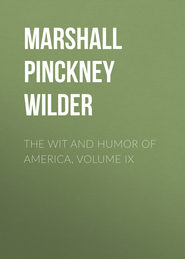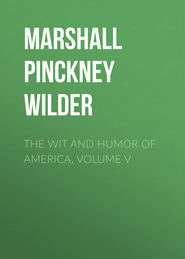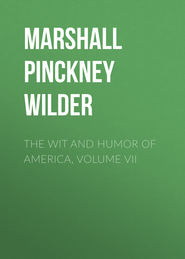По всем вопросам обращайтесь на: info@litportal.ru
(©) 2003-2024.
✖
The Wit and Humor of America, Volume VI
Автор
Год написания книги
2019
Настройки чтения
Размер шрифта
Высота строк
Поля
Mr. Williams had four chips and a dollar left.
"I sees dat seven," he said impressively, "an' I humps it ten mo'."
"Whar's de c'lateral?" queried the Reverend Mr. Smith calmly, but with aggressiveness in his eye.
Mr. Williams sniffed contemptuously, drew off the ring, and deposited it in the pot with such an air as to impress Mr. Whiffles with the idea that the jewel must have been worth at least four million dollars. Then Mr. Williams leaned back in his chair and smiled.
"Whad yer goin' ter do?" asked the Reverend Mr. Smith, deliberately ignoring Mr. Williams's action.
Mr. Williams pointed to the ring and smiled.
"Liff yo' ten dollahs."
"On whad?"
"Dat ring."
"Dat ring?"
"Yezzah." Mr. Williams was still cool.
"Huh!" The Reverend Mr. Smith picked the ring up, examined it scientifically with one eye closed, dropped it several times as if to test its soundness, and then walked across and rasped it several times heavily on the window pane.
"Whad yo' doin' dat for?" excitedly asked Mr. Williams.
A double rasp with the ring was the Reverend Mr. Smith's only reply.
"Gimme dat jule back!" demanded Mr. Williams.
The Reverend Mr. Smith was now vigorously rubbing the setting of the stone on the floor.
"Leggo dat sparkler," said Mr. Williams again.
The Reverend Mr. Smith carefully polished off the scratches by rubbing the ring a while on the sole of his foot. Then he resumed his seat and put the precious thing back into the pot. Then he looked calmly at Mr. Williams, and leaned back in his chair as if waiting for something.
"Is yo' satisfied?" said Mr. Williams, in the tone used by men who have sustained a deep injury.
"Dis is pokah," said the Reverend Mr. Thankful Smith.
"I rised yo' ten dollahs," said Mr. Williams, pointing to the ring.
"Did yer ever saw three balls hangin' over my do'?" asked the Reverend Mr. Smith. "Doesn't yo' know my name hain't Oppenheimer?"
"Whad yo' mean?" asked Mr. Williams excitedly.
"Pokah am pokah, and dar's no 'casion fer triflin' wif blue glass 'n junk in dis yar club," said the Reverend Mr. Smith.
"I liffs yo' ten dollahs," said Mr. Williams, ignoring the insult.
"Pud up de c'lateral," said the Reverend Mr. Smith. "Fo' chips is fohty, 'n a dollah's a dollah fohty, 'n dat's a dollah fohty-fo' cents."
"Whar's de fo' cents?" smiled Mr. Williams, desperately.
The Reverend Mr. Smith pointed to the ring. Mr. Williams rose indignantly, shucked off his coat, hat, vest, suspenders and scarfpin, heaped them on the table, and then sat down and glared at the Reverend Mr. Smith.
Mr. Smith rolled up the coat, put on the hat, threw his own out of the window, gave the ring to Mr. Whiffles, jammed the suspenders into his pocket, and took in the vest, chips and money.
"Dis yar's buglry!" yelled Mr. Williams.
The Reverend Mr. Smith spread out four eights and rose impressively.
"Toot," he said, "doan trifle wif Prov'dence. Because a man wars ten-cent grease 'n' gits his july on de Bowery, hit's no sign dat he kin buck agin cash in a jacker 'n' git a boodle from fo' eights. Yo's now in yo' shirt sleeves 'n' low sperrets, bud de speeyunce am wallyble. I'se willin' ter stan' a beer an' sassenger, 'n' shake 'n' call it squar'. De club'll now 'journ."
THE BUMBLEBEAVER[7 - From "Mixed Beasts," by Kenyon Cox. Copyright 1904, by Fox, Duffield & Co.]
BY KENYON COX
A cheerful and industrious beast,
He's always humming as he goes
To make mud-houses with his tail
Or gather honey with his nose.
Although he flits from flower to flower
He's not at all a gay deceiver.
We might take lessons by the hour
From busy, buzzy Bumblebeaver.
AFTER THE FUNERAL
BY JAMES M. BAILEY
It was just after the funeral. The bereaved and subdued widow, enveloped in millinery gloom, was seated in the sitting-room with a few sympathizing friends. There was that constrained look so peculiar to the occasion observable on every countenance. The widow sighed.
"How do you feel, my dear?" said her sister.
"Oh! I don't know," said the poor woman, with difficulty restraining her tears. "But I hope everything passed off well."
"Indeed it did," said all the ladies.
"It was as large and respectable a funeral as I have seen this winter," said the sister, looking around upon the others.
"Yes, it was," said the lady from next door. "I was saying to Mrs. Slocum, only ten minutes ago, that the attendance couldn't have been better—the bad going considered."
"Did you see the Taylors?" asked the widow faintly, looking at her sister. "They go so rarely to funerals that I was surprised to see them here."
"Oh, yes! the Taylors were all here," said the sympathizing sister. "As you say, they go but a little: they are so exclusive!"
"I thought I saw the Curtises also," suggested the bereaved woman droopingly.








